
Social worker, Center for Emotionally Disturbed Children, Osaka
Municipal Government
Sponsored by the Osaka-Shirokita Rotary Club
Introduction
I recently visited the Netherlands as a member of the GSE team, under the sponsorship of the Osaka-Shirokita Rotary Club. This was my first associtation with the Rotary International, and it has proven to be a valuable opportunity for me to understand the ideology and activities of the Rotary Club. Also, this GSE program has had a significant impact on my way of thinking and activities on the job.
I am currently employed at the Osaka Municipal Center for Emotionally Disturbed Children (a short-term treatment facility for children with emotional problems) as a social worker, and my main work involves trying to help children who have been abused. The main purpose of my vocational study in the Netherlands was to research social problems and the educational system there, and, in particular, to research how they deal with abused children.
The Present Situation in the Netherlands and Relevant Topics
Through my interchange with my host families and non-vocational study trips, I was able to view Dutch society from a variety of angles during my time in the Netherlands. The things that left the deepest impression on me were the economic conditions and the social problems.
1) Economic conditions in the Netherlands
Right now, the economy in the Netherlands is doing well. I was able to visit a number of companies while I was there and speak to many Rotarians. Everyone I spoke to said the same thing: "The economy is good." Over the past few years, home prices have skyrocketed and there is a housing boom in urban areas. Unemployment is very low, and university graduates are being snatched up by large corporations. Because of this, there is a serious shortage of teachers, social workers and medical workers, I heard.
When I saw these conditions in the Netherlands, it reminded me of Japan's "bubble economy" of the mid-80s, but the Dutch gave me the impression of busily going about their lives (both work and leisure) without any concern.
2) Social problems in the Netherlands: Prostitution and crime
In general, you could say that the economy is fundamentally
good, and society is stable, but as a social worker, my eyes are naturally drawn
to what I see to be social problems. When one mentions the Netherlands, I think
many naturally think of Amsterdam's red-light district where prostitutes sit
in open windows "showing their wares." In the Netherlands, prostitution is legal
and controlled by the government. In the suburbs, I saw a prostitution area
in a parking lot (the places where the prostitutes serviced the customers were
just divided by screens) and customers started arriving in their cars around
2:00 in the afternoon. (See photo 1.)
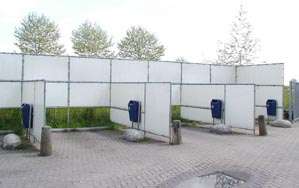
Also, in a guidebook for the Netherlands, I saw a warning to tourists to be careful about pickpockets and bag snatchers. Such petty crime is a very serious problem in the large cities, such as Amsterdam. One weekend, our GSE team visited Amsterdam, and before we left, all our host families and many Rotarians told us to be on the alert for pickpockets and bag snatchers. Thanks to their warnings, none of us had anything stolen while we were there.
3) Drug- and immigrant-related problems
The prostitution and crime problems are not anything particularly shocking to the Japanese, but the background behind such problems in our two countries is very different. This is because in the Netherlands, it is drugs and immigrants that are fueling these problems.
In the Netherlands, soft drugs and hard drugs are clearly separated,
with soft drugs being subject to government control and management. By soft
drugs, I mean marijuana and hashish, which are sold and smoked at places called
"coffee shops." When we were in Arnhem, our GSE team visited a coffee shop with
the local police chief and we were able to get a feel for the actual atmosphere
in such places. (See photo 2.)
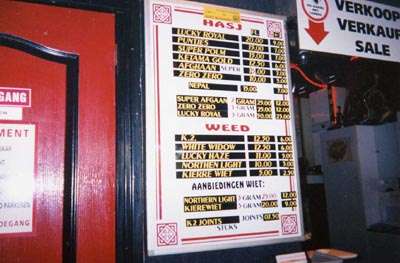
The place reeked of marijuana and it was rather dark, but I got the feeling that the soft drug trade is well managed by the government (police). However, in order to come up with the money they need for these soft drugs, many are actively involved in prostitution and petty crime, and sometimes there are soft drug-related murders. So the drug problem is bigger than imagined and it is a very difficult problem, I think.
The immigrant problem is also quite complicated. People from all over the world are flocking to the Netherlands seeking work and a better way of life. Of course, there are also those who go there for political reasons. The immigrants come mostly from Africa, Eastern Europe and the Middle-East, and it seemed to me that there were many from Turkey and Morocco, in particular.
I think the Dutch are basically quite tolerant and generous
toward these immigrants, but there seem to be a number of problems springing
up. For example, more and more children are unable to speak Dutch and these
children are presenting problems for teachers and schools. (See photo 3.)
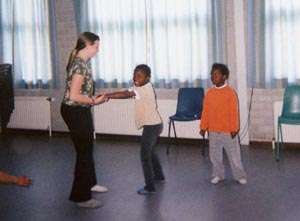
Also, I mentioned the red-light district of Amsterdam earlier, and it may be amusing and interesting for tourists such as us to take a bus tour there, but the fact of the matter is, many foreign women and families are living and working there because there is nothing else for them to do.
Vocational Study Trips
My vocational study trips were much more beneficial and helpful than I had imagined they would be. I was given the opportunity to learn about education, welfare and the child abuse problem in the Netherlands during these trips.
1) Education in the Netherlands
In Neede, I visited a special school for children with learning disabilities, etc. who were unable to keep up with other children in regular schools. The school I visited housed elementary, junior high and senior high school students. In the elementary school program, the main goal was to help these children return as quickly as possible to a regular school, so there were only fewer children in each class. In the junior and senior high school program, the main emphasis was on helping these children become employable in the future. In other words, no matter what their problems or disabilities, the fundamental philosophy behind their education was to help them learn to live independent lives after graduation. In Japan, I think we have adequate programs for children with intellectual and physical disabilities, but I was very interested in the Dutch approach to helping children with learning disabilities and those who are hyperactive, because we have nothing for these problems in Japan.
Also, in Bennekom, I visited a college (similar to the vocational
schools we have in Japan). At this college, I saw a day-care room that was provided
for those students who are mothers, and it seemed that married women and women
who have just had babies were actively pursuing an education. (See photo 4.)
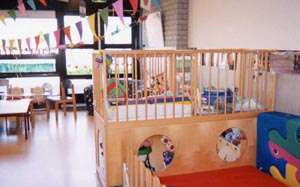
In the Netherlands, there are also evening courses offerred
to those with intellectual disabilities because they are working during the
day. These students study in the evenings to learn the skills they need in order
to live more independent lives. (See photo 5.)
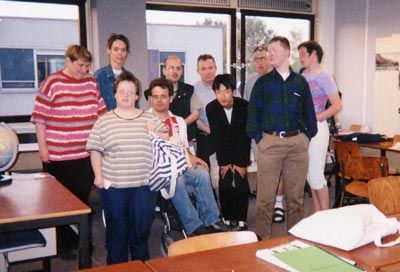
They choose the classes they want to take by themselves, and come to school on a bus provided by the school. In Japan, as well, we have recently begun to see an emphasis being placed on the need for "lifetime learning," but in the Netherlands, I got the impression that a large variety of people are having their educational needs met.
2) Welfare in the Netherlands
In Doetinchem, I visited the largest social welfare facility
in the Netherlands, the Philadelphia Institute. There, people with severe intellectual
and physical disabilities are housed, and I heard that there are similar facilities
located throughout the Netherlands. While I was there, I was able to talk to
a music therapy therapist. (See photo 6.)
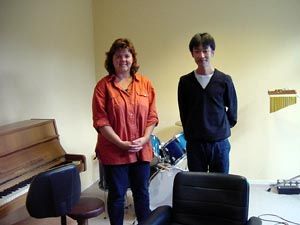
In Japan, there has been growing interest lately in music therapy, and there are discussions underway to formulate national qualification standards for therapists, and the situation is the same in the Netherlands. I got the impression, however, that the Dutch are working very forthrightly to create welfare facilities that are very practical.
3) Child Abuse in the Netherlands
</U> In recent years, there has been growing concern about child abuse in Japan, and the mass media have been actively dealing with this problem. Child abuse is also a serious problem in the Netherlands, and they are aggressively dealing with the problem. But, the way in which our two countries are dealing with our respective child abuse problems is very different.
In Japan, when serious child abuse is involved, the children are taken into government custody and placed in welfare facilities or foster homes. In the Netherlands, however, even the most serious cases are dealt with in a way (as much as possible) that offers support to the family and allows the children to live with their family. In other words, in the Netherlands, they view family ties to be very important, and they operate under the basic philosophy that society is responsible to help families raise their children and live together. The abusive parent is not viewed as a criminal, but rather as a victim of social circumstances. For this reason, abusers receive thorough support and treatment.
While I was in the Netherlands, I was able to interview a social worker and a doctor who works at an organization that specializes in child abuse. In recent years, the government has be aggressively pursuing policies and revising services to deal with the child abuse problem, and I was able to get the latest information from these two people. We were able to have very practical discussions, and the exchange of opinions was very meaningful to me. It has helped me to reconsider and reevaluate some of the problems I have been dealing with in my work here in Japan.
This visit and interview was made possible because of the help and cooperation of a Rotarian (one of the hosts of one of my GSE team members). Normally, it is not possible for someone from the outside to go to such a facility and have the opportunity to look around and talk with a person in charge because of the fact that child abuse is such a delicate issue. But when this Rotarian learned that I was interested in the child abuse problem, he got a list of the doctors in the area and began searching for one who specialized in child abuse. He then contacted the doctor and set up an appointment for me to meet with him. Things like this happened a number of times while I was in the Netherlands, and I was able to experience the kindness of the Dutch Rotarians every day we were there.
What I Learned Through the GSE Program
1) The importance of teamwork
The GSE program is not something someone can participate in alone. It is a team effort. The quality of the GSE presentation given by the team at Rotary Club meetings is directly related to how often the team gets together to work on it prior to departure and how hard they prepare for it. When one arrives in the foreign country, the people they ultimately depend upon in times of trouble are the other team members. It is crucial that a team member understands the importance of teamwork and that he cooperates as one member of the team.
In my case, I had not thought so much of the importance of teamwork in relation to my job. Through my participation in the GSE program, however, my way of thinking has changed 180 degrees. As a result, after returning to Japan, my stance has changed completely at work, and I have come to realize the importance of working together with my colleagues.
2) Smile/Try to Understand/Ask Questions
In the Netherlands, of course, we had to communicate with people in English. Until this trip, I had never spent such a long time overseas, and I was very uneasy about communicating in English.
My goal while in the Netherlands was, by trial and error, to "smile, try to understand and ask questions."
The first thing I noticed was the importance of "smiling." I don't think it is necessary to force yourself to smile when you are feeling bad, but, in principle, I think smiling at the other person plays a large role in helping make communication successful.
By "trying to understand" I mean listening carefully to what the other person is saying, and, if you don't understand, honestly asking him to repeat what he said. In my own case, I had the habit of nodding my head even when I did not understand what was being said, so I tried hard in the Netherlands to say "I don't understand" when I wasn't sure what had been said.
By "ask questions" I mean that it is important to have a positive, forthright attitude when it comes to asking questions after you understand what the other person has said. It isn't easy to ask questions in English, but I made it my goal to be as forthright as possible in this regard. In retrospect, I think I could have tried a little harder in this regard.
In Conclusion
The five weeks I spent in the Netherlands was a short time, but it had a very big impact in my life. It was an invaluable experience. My being able to visit the Netherlands as a member of the GSE team has been a tremendous asset in my life. I want to make sure that I make the most of the things I experienced and learned through the GSE program, and I want to work hard to make a contribution to society based on what I learned there. I would also like to express my heartfelt thanks to the Rotarians who supported me throughout the various aspects of the GSE program, both here in Japan and in the Netherlands.